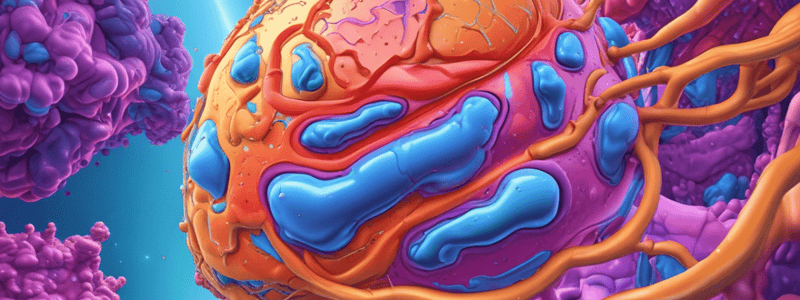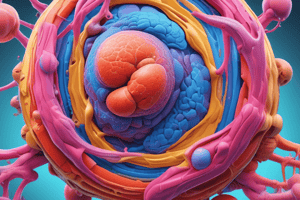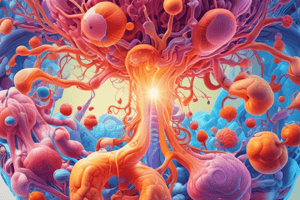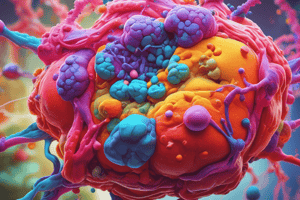Podcast
Questions and Answers
Which cell type in the pancreas secretes insulin?
Which cell type in the pancreas secretes insulin?
- Beta cells (correct)
- Delta cells
- Alpha cells
- F cells
What type of hormone does a Delta cell in the pancreas secrete?
What type of hormone does a Delta cell in the pancreas secrete?
- Insulin
- Pancreatic Polypeptide
- Somatostatin (correct)
- Glucagon
Which hormone is mainly secreted by Alpha cells in the pancreas?
Which hormone is mainly secreted by Alpha cells in the pancreas?
- Pancreatic Polypeptide
- Glucagon (correct)
- Somatostatin
- Insulin
What is the primary function of F cells (PP cells) in the pancreas?
What is the primary function of F cells (PP cells) in the pancreas?
Which of the following cell types in the pancreas is involved in endocrine functions related to glucose metabolism?
Which of the following cell types in the pancreas is involved in endocrine functions related to glucose metabolism?
What type of hormones are produced by all pancreatic islet cells?
What type of hormones are produced by all pancreatic islet cells?
What is removed in the ER to form proinsulin?
What is removed in the ER to form proinsulin?
Which test helps differentiate between Type 1 and Type 2 diabetes?
Which test helps differentiate between Type 1 and Type 2 diabetes?
What stimulates insulin release in omnivores?
What stimulates insulin release in omnivores?
Which substance stimulates the secretion of another substance?
Which substance stimulates the secretion of another substance?
What is the main effect of an increase in blood glucose concentration?
What is the main effect of an increase in blood glucose concentration?
Which GLUT transporter is insulin independent and found on the membrane surface of beta cells?
Which GLUT transporter is insulin independent and found on the membrane surface of beta cells?
What type of kinetics describes the secretion of insulin from beta cells?
What type of kinetics describes the secretion of insulin from beta cells?
Where does insulin bind after secretion from beta cells?
Where does insulin bind after secretion from beta cells?
Which GLUT transporter is the only insulin-sensitive transporter facilitating glucose entry into cells?
Which GLUT transporter is the only insulin-sensitive transporter facilitating glucose entry into cells?
What is the net effect of insulin on the blood concentration of glucose, fatty acids, and amino acids?
What is the net effect of insulin on the blood concentration of glucose, fatty acids, and amino acids?
Which process involves the breakdown of triglycerides into fatty acids and glycerol?
Which process involves the breakdown of triglycerides into fatty acids and glycerol?
Which of the following is promoted by insulin in muscle cells?
Which of the following is promoted by insulin in muscle cells?
What does insulin inhibit in relation to lipid metabolism?
What does insulin inhibit in relation to lipid metabolism?
In which cells does insulin promote the reduction of disulfide bonds and subsequent protease activity?
In which cells does insulin promote the reduction of disulfide bonds and subsequent protease activity?
What is the main role of insulin in the process of glycogenesis?
What is the main role of insulin in the process of glycogenesis?
What is the fate of proinsulin after it is packaged into C vesicles in the Golgi apparatus?
What is the fate of proinsulin after it is packaged into C vesicles in the Golgi apparatus?
What substance is important for stimulating insulin release in carnivores?
What substance is important for stimulating insulin release in carnivores?
What determines the importance of secretagogues for insulin release in different species?
What determines the importance of secretagogues for insulin release in different species?
What effect do fatty acids have on insulin release in humans?
What effect do fatty acids have on insulin release in humans?
What is the effect of resistance exercise on GLUT4?
What is the effect of resistance exercise on GLUT4?
How does insulin facilitate glucose entry into cells?
How does insulin facilitate glucose entry into cells?
Which type of cells require insulin for glucose uptake into cells?
Which type of cells require insulin for glucose uptake into cells?
What stimulates the secretion of pre-synthesized insulin in beta cells?
What stimulates the secretion of pre-synthesized insulin in beta cells?
What is the predominant effect of insulin on fatty acids in muscle cells?
What is the predominant effect of insulin on fatty acids in muscle cells?
Which process is directly inhibited by insulin in adipocytes?
Which process is directly inhibited by insulin in adipocytes?
What is the effect of insulin on glycogenolysis in the liver?
What is the effect of insulin on glycogenolysis in the liver?
Which of the following is promoted by insulin in hepatocytes?
Which of the following is promoted by insulin in hepatocytes?
What effect does insulin have on protein metabolism?
What effect does insulin have on protein metabolism?
What cells in the pancreas are involved in the exocrine function by secreting digestive enzymes?
What cells in the pancreas are involved in the exocrine function by secreting digestive enzymes?
What percentage of the pancreas do the Alpha α cells typically make up?
What percentage of the pancreas do the Alpha α cells typically make up?
What stimulates insulin release in humans, along with glucose?
What stimulates insulin release in humans, along with glucose?
What substance is primarily important for stimulating insulin release in carnivores?
What substance is primarily important for stimulating insulin release in carnivores?
Which GLUT transporter is primarily responsible for facilitating glucose entry into cells in muscle and adipose tissue?
Which GLUT transporter is primarily responsible for facilitating glucose entry into cells in muscle and adipose tissue?
What stimulates the translocation of GLUT4 to the muscle membrane, thus increasing glucose uptake by the cell?
What stimulates the translocation of GLUT4 to the muscle membrane, thus increasing glucose uptake by the cell?
After the secretion of insulin from beta cells, where does insulin bind in target tissues?
After the secretion of insulin from beta cells, where does insulin bind in target tissues?
What is the process by which insulin promotes the storage of glucose as glycogen?
What is the process by which insulin promotes the storage of glucose as glycogen?
Which of the following processes is promoted by insulin in adipocytes?
Which of the following processes is promoted by insulin in adipocytes?
In the absence of insulin, muscle cells rely more on which of the following as a fuel source?
In the absence of insulin, muscle cells rely more on which of the following as a fuel source?
Which process involves the conversion of Amino acids into Proteins with the help of insulin?
Which process involves the conversion of Amino acids into Proteins with the help of insulin?
What is the main effect of insulin on lipolysis in hepatocytes?
What is the main effect of insulin on lipolysis in hepatocytes?
What does insulin reduce in muscle cells to enhance glucose uptake and promote energy production?
What does insulin reduce in muscle cells to enhance glucose uptake and promote energy production?
Flashcards are hidden until you start studying
Study Notes
Pancreas Structure and Functions
- The pancreas is a glandular organ located in the abdominal cavity, with two lobes (one behind the stomach and the other in apposition to the proximal duodenum)
- Exocrine pancreas: secretes digestive enzymes into the duct lumen of the duodenum
- Endocrine pancreas (islets of Langerhans): secretes hormones into the blood, involved in glucose metabolism and regulation of blood glucose levels
Islets of Langerhans
- 4 types of cells: alpha, beta, delta, and F cells
- Produce 4 hormones: glucagon, insulin, somatostatin, and pancreatic polypeptide
- Beta cells (>70%): produce insulin
- Alpha cells (20%): produce glucagon
- Delta cells (5%): produce somatostatin
- F cells (<5%): produce pancreatic polypeptide
Insulin Structure and Synthesis
- Insulin is a polypeptide hormone produced by pancreatic beta cells in response to hyperglycemia
- Active insulin: two peptide chains (alpha and beta) connected by disulfide bridges
- Insulin synthesis: pre-proinsulin → proinsulin → mature insulin
Insulin Secretion and Kinetics
- Insulin secretion is biphasic: acute phase (secretion of pre-synthesized insulin) and chronic phase (synthesis and secretion of new insulin)
- Insulin release is stimulated by glucose, amino acids, and fatty acids
- Insulin secretion follows a glucose-dependent mechanism: high glucose concentration in the extracellular fluid leads to increased insulin secretion
Insulin-Receptor Interaction and Metabolic Effects
- Insulin binds to specific membrane receptors on target tissues (RTK Receptor Tyrosine Kinase)
- Insulin facilitates glucose entry into cells by increasing the number of GLUT4 transporters in the cell membrane
- Insulin effects on target tissues:
- Muscle: increases glycogen synthesis, glucose uptake, and protein synthesis
- Adipose tissue: increases glucose uptake, lipogenesis, and inhibits lipolysis
- Liver: increases glycogen synthesis, glycolysis, and inhibits gluconeogenesis and glycogenolysis
Insulin Clearance
- Insulin is metabolized mainly by the liver and excreted by the kidneys
- Insulin half-life: 10 minutes### Insulin Synthesis and Secretion
- Synthesized as preproinsulin in the rER
- Signal sequence is removed in the ER to form proinsulin
- Converted to mature insulin in the Golgi apparatus
- C-peptide is cleaved, and insulin is packaged into vesicles
Insulin Structure
- Differences in amino acid sequences between species are small
- Porcine insulin differs from human insulin by 1 amino acid
- Bovine insulin differs from cat insulin by 1 amino acid
- Porcine and canine insulin are exactly the same
Insulin Secretion
- Secretion is triggered by various stimuli, including:
- Nutritional (glucose, amino acids, fatty acids)
- Paracrine
- Neural
- Endocrine
- Glucose is an important secretagogue for omnivores
- Amino acids are important for carnivores
- Fatty acids stimulate insulin release in humans
- Hyperglycemia triggers insulin secretion and production
- Glucose concentration inside beta cells directly affects insulin secretion
Insulin Release Kinetics
- Biphasic secretion of insulin:
- Acute phase: secretion of pre-synthesized insulin
- Chronic phase: synthesis and secretion of insulin
Insulin Action
- Binds to specific receptors (RTK) on target tissues
- Facilitates glucose entry into cells by increasing GLUT4 in the cell membrane
- Net effect is to lower blood glucose, fatty acids, and amino acids
- Promotes anabolic effects, including glycogen synthesis, fatty acid synthesis, and protein synthesis
- Inhibits lipolysis and gluconeogenesis
Tissue-Specific Effects
- Muscle:
- Stimulates glycogen synthesis
- Promotes glucose uptake
- Enhances amino acid uptake and protein synthesis
- Adipose tissue:
- Stimulates glucose uptake and glycogen synthesis
- Promotes fatty acid synthesis and triglyceride formation
- Liver:
- Stimulates glycogen synthesis and glycolysis
- Decreases gluconeogenesis and glycogenolysis
Insulin Metabolism
- Mainly metabolized by the liver
- Excreted by the kidneys
- Broken down into peptides and amino acids by liver enzymes
Studying That Suits You
Use AI to generate personalized quizzes and flashcards to suit your learning preferences.




